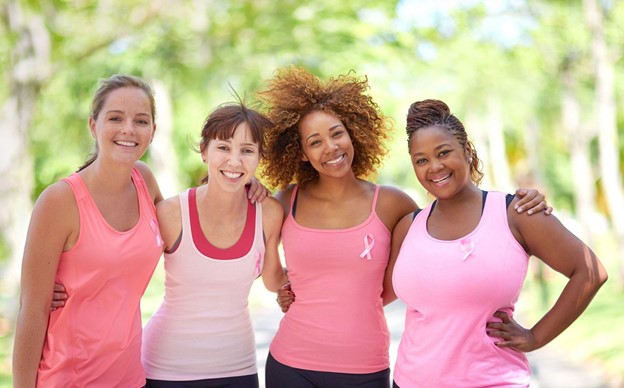Breast cancer has affected millions of women worldwide, and chances are you or someone you know has been impacted by this disease.
Though there is no known way to prevent or cure breast cancer, there are steps you can take to reduce your risk, especially if you take action while you’re younger and healthier. Here is a list of things you can do and lifestyle changes that could reduce the risk of developing breast cancer.
Lead an Active Lifestyle
Experts agree that consistent moderate to intense exercise is linked to lowering the risk of breast cancer, so regular physical activity is a must. Spreading your activity throughout the week is ideal. It’s not necessarily about how hard you push yourself, but rather that you keep your body moving. Just like you may have learned in high school science class, a body in motion tends to stay in motion, while a body at rest tends to stay at rest. Find a physical activity that’s both fun and challenging. Try combining cardiovascular exercise with muscular training for best results. Regular exercise can also help lead to weight loss, lowering your risk of developing breast cancer even further.
See Your Doctor Regularly
Your healthcare provider can determine your risk of breast cancer and help support you to stay on top of your physical fitness and eating habits. If you have reason to believe that you may be at higher risk for breast cancer due to family history or a gene mutation, your doctor may recommend additional steps you can take to help lower your risk or potentially find it early on. These could include genetic counseling, prescription medication, or prophylactic surgery. Additionally, make sure to discuss all contraceptive options with your doctor, as some evidence suggests that birth control pills and IUDs that release hormones could potentially increase the risk of breast cancer.
Eat Right
Some diets, such as the Mediterranean diet that includes extra-virgin olive oil and lots of mixed nuts, may come with a reduced risk of breast cancer. Diets with high levels of fruits, vegetables, and whole grains and lower amounts of meat and dairy are ideal. Though no special diet is required for lowering your risk, staying away from processed foods, sugar, and trans fats, maintaining a healthy weight, and not smoking are always good ideas.
Take It Easy On the Alcohol
Even in low amounts and on infrequent occasions, drinking alcohol has been linked to an increased risk of developing breast cancer. Though drinking no alcohol is ideal, women who limit themselves to one alcoholic beverage per day (measured as 12 ounces of beer, 5 ounces of wine, or 1.5 ounces of hard liquor) are putting themselves in a better position than those who drink more.
Breastfeed
If you’re a new mother, breastfeeding your baby is beneficial for a number of reasons, one of them being increased protection against developing breast cancer. According to some researchers, mothers who breastfeed lower their risk of pre- and post-menopausal breast cancer. Breastfeeding for at least one year or more can provide additional protection.
Know the Signs
Be attentive to breast cancer detection. See your doctor immediately if you notice any new lumps or changes on your skin on or near your breasts. Ask your doctor about routine mammograms and other preventative screenings based on your own personal medical history.
No one deserves to develop breast cancer, and these tips will put you in the best position to reduce your risk as much as possible. In general, a healthy and active lifestyle will lead to more noticeable and immediate positive changes in addition to helping you minimize your risk for developing breast cancer as much as possible.
Comments are not available on this story.
Send questions/comments to the editors.



